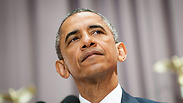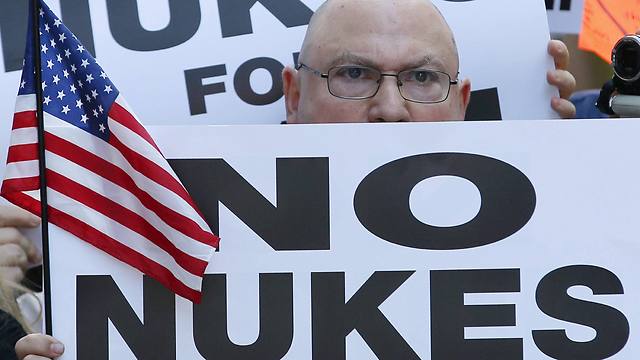
Obama. An alleged 'victory' over the president is a three-way loss
צילום: EPA
Israel only stands to lose from 'defeating' Obama
Op-ed: Thwarting the nuclear agreement and humiliating the White House will not help stop the nuclear program in any way, and will only weaken the American foreign policy vis-à-vis Iran's support for terror and its deep involvement in all centers of stability in the Middle East.
Last week, I was invited to meet with Congress members in Washington to discuss the nuclear agreement, and during my visit I realized that the issue is at the top of the agenda in America.

The debate is no longer being held only on Capitol Hill and on the route between Congress and the White House: It has spilled to the street, and in the big cities protest events are being held and petitions are being signed on both sides. The agreement is generating more and more coverage in the American media as well.
It is very impressive to see that indifferent America is no longer so indifferent, and it is as impressive to see the sincere interest in Israel's opinion and the understanding that part of the American public is showing towards Israel's concerns regarding the agreement.
This may have to do with the smell of elections which is already in the air, but one cannot ignore the fact that America is not only focused on the unemployment and health insurance issues. The problematic agreement has awakened the American public from its ongoing apathy towards foreign affairs, and that is something too.
The administration was particularly surprised, as it did not expect the intensity and scope of the reactions, which have forced President Barack Obama and Secretary of State to deal with the issue on a daily basis, while presenting the Netanyahu government as the agreement's "enemy."

NY protest against Iran deal. The US should remain part of the agreement and work to supervise its implementation as much as it can, rather than leaving this job to the other world powers (Photo: Reuters) (צילום: רויטרס)
But alongside the many profound questions raised in the discussions, there is a clear key understanding in the United States that this is not a good agreement, but rather the least worst practical option.
From a professional outlook, one can say that even if only 75 percent of what is written in the agreement will be implemented, and even if it lasts only 75 percent of the time stated in it, this agreement is better than anything that could have been achieved in other ways, including a strike which would have certainly led to a regional flare-up and to the completion of the nuclear project within a short period of time. So the voluntary inactivation of the Arak reactor, the dismantlement of most centrifuges in Natanz and the removal of almost all enriched uranium out of Iran are a notable achievement – if they are indeed fulfilled.
The agreement has already hit the road. Congress can't really stop it. China, Russia and Europe are already committed to it. The only thing that can happen is that the US will remain outside the agreement, and that's the worst option. The US should remain part of the agreement and work to supervise its implementation as much as it can, rather than leaving this job to the other world powers.
As the abilities of the International Atomic Energy Agency (IAEA) are limited, it will find it difficult to fulfill its role without the help of the world powers, particularly the US, both in terms of the intelligence aspect and the technological aspect.
But first and foremost, there is a need for a significant weight of leadership, which will continue to wave a threatening finger at the Iranians. And that is something only the Americans can do. Without the US, the IAEA will turn into an empty tool, as it has in the past. When that happens, the pessimists will be able to say that they were right, although their activity is what helped fulfill their prophecy.
In every basic strategy course or book, one learns that the main rule in setting diplomatic targets is which wars should not be fought, and when should one let go of lost wars in order to focus on and succeed in the next wars. Thwarting the agreement and humiliating the White House will not help stop the nuclear program in any way, and will only weaken the American foreign policy vis-à-vis the "terrornization" – Iran's support for terror and its deep involvement in all centers of stability in the Middle East.
Israel should understand that not only does it not stand to gain anything, but that it can only lose. An alleged "victory" over the president is a three-way loss: Israel will also lose supervision over the nuclear program, also encourage a hostile foreign policy and will also open a window for revenge on Washington's part.
Major-General (res.) Israel Ziv served as head of the Operations Directorate branch in the IDF's General Staff.










